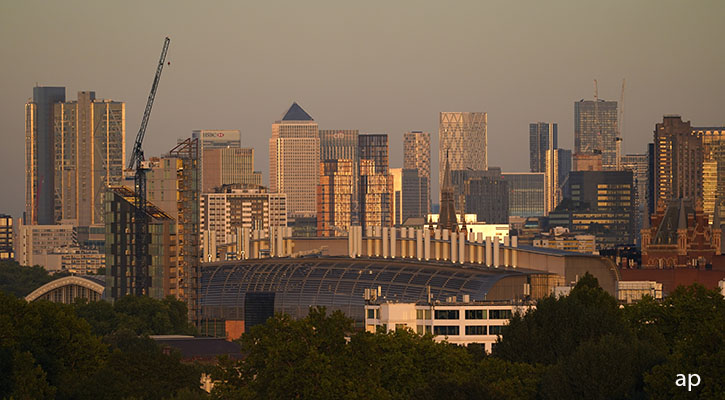
It’s been a tough five years for UK property investors and 2024 has maintained the trend. Outflows from open-ended funds continue, another big name fund has announced its closure, while investment trust performance has been poor, with discounts widening.
Over the past 12 months, almost £1 billion has been withdrawn from UK-domiciled funds making direct investments into UK property over the past year. In contrast, while global property funds aren’t seeing inflows, the net outflows are only a tenth of the size of UK property withdrawals, at £88 million as of the end of October.
In October this year, the property direct UK category totaled £2.80 billion if we exclude fund of funds and feeder funds. Three years ago, in October 2021, the category had assets worth £7.77 billion.
As can be seen in the below charts, monthly outflows have regularly passed £100 million over the past years, too.
At the end of November, St James’ Place STJ revealed that it is winding down the near £2 billion property fund it originally suspended in October last year. The wealth manager’s decision follows M&G, Aegon and Aviva, which all started winding up their property funds last year. Most funds that are still open failed to match the UK stock market gains this year.
The largest fund in the sector, L&G Property, remains open. This £1 billion plus open-ended fund has posted returns of 5% so far this year, following a return of 0.32% in 2023 and a loss of 10.94% in 2022.
My colleague James Gard last year pointed out that the closures raise questions about the future of the wider property fund sector, which collectively still has billions invested after battling Brexit outflows and the covid-driven move to flexible and remote work.
Regulator Doesn’t Like UK Property Funds
Not only are these funds battling outflows and unfavorable market conditions. Property authorized investment funds (PAIFs) have come under fire from the Financial Conduct Authority, which thinks these products are unsuitable for investing directly in property due to the “liquidity mismatch” between their assets and the need for daily pricing.
When the St James’s Place fund suspended trading in 2023, its director investments Tom Beal summed up the dilemma: “Selling properties under such pressure may lead to the fund manager selling them for less than their actual market value, potentially resulting in financial losses for the fund and its investors.”
The FCA has been consulting on ways to solve it for a number of years, looking at options such as locking in investors for longer periods, an idea hampered by the fact investors are now used to frequent trading via investment platforms and apps. Investors have already voted with their feet and money has migrated elsewhere.
Open-ended funds need to sell fund units to meet redemption requests. If you own an open-ended property fund, it’s worth checking what it owns; it may also own real estate investment trusts (REITs). Or, you you prefer equity exposure rather than direct commercial property assets, you can also buy property or property income funds that own housebuilder shares. Multi-asset funds often have some property exposure, but this tends to be of a global nature. So the asset class itself is not going to disappear.
Should I Invest in Property Via Trusts?
On the closed-end side we have REITs, which some experts argue are better suited for illiquid assets than its open-end counterparts.
REITs were introduced in 2007 and as explained in our guide, these are listed companies whose share prices move around daily, sharing the same characteristics of investment trusts as vehicles that pool investors’ money to own a diverse portfolio of direct property assets.
Like other investment trusts, REITs trade at a discount or premium to net asset value (NAV), an additional dynamic that investors need to bear in mind. Trusts' use of borrowing or “gearing” to enhance returns can also increase volatility.
Investment trusts in general have had a turbulent year, seeing mergers and consolidation as the sector tries to stay relevant as passive funds increase in popularity with retail investors.
UK Property Trusts at a Discount
With the failure of the open-ended model for property funds, money has flown into trusts instead, but this has not paid off in performance. REITs are interest-rate-sensitive, which means they tend to outperform the broad market when interest rates fall – and underperform when interest rates rise. Many trusts are therefore trading at big discounts: for example, Tritax Big Box BBOX, a trust worth worth more than £3 billion, is trading at a near 30% discount to NAV.
But there could be change coming. Fund manager of TR Property TRY Marcus Phayre-Mudge recently stated that they are seeing an encouraging, albeit bumpy, recovery in listed real estate.
“Demand for top-quality properties is outstripping supply in nearly all sectors. Over this period, there has been a positive shift in sentiment. However, we remain in a divided market: the best buildings in prime locations are attracting strong tenant demand, while others are struggling. This bifurcated environment supports TR Property’s investment approach and appeal given our underlying asset exposure.”
The REIT sector has seen multiple mergers and acquisitions in 2024. UK Commercial Property REIT was taken over by Tritax Big Box BBOX, LXi REIT was acquired by LondonMetric LMP, and Capital & Regional was taken over by NewRiver REIT NRR. Also noteworthy was the takeover of former REIT giant Civitas Social Housing, acquired by a Hong Kong property developer.
But there are still plenty options available on the London Stock Exchange. We have gathered a list of all the REITs available in the FTSE 100 and FTSE 250.
Should I Get UK Property Exposure via Stocks Instead?
While property funds are struggling and REITs are cheap, houses are still being built around the country, indirect exposure to housing could be another way to bet on the property sector without the risk of bricks and mortar. And, while commercial property struggled during covid, house prices soared, before stagnating when interest rate hikes and the post-lockdown cost-of-living crisis dominated the conversation).
As a result, housebuilding stocks appear attractive going into the new year according to Morningstar Investment Management’s 2025 outlook.
“UK homebuilders have been through the wringer. At one point, they lost two thirds of their value from the 2021 lockdown highs, share prices have rallied over the past year, but we still believe names in this space could rise by as much as 50%,” it says.
“Lower interest rates are leading to more affordable mortgages, and supportive government policy should help pave the way in 2025.”
Earlier this year, Morningstar’s analyst Grant Slade also offered his top picks for the sector as the housing market recovers: Persimmon PSN, Bellway BWY, Taylor Wimpey TW. and Barratt (now Barratt Redrow BTRW).
How Do Property Funds Work?
Property Authorised Investment Funds (PAIFs) are open-ended funds that invest directly in commercial property, including big buildings such as offices, shopping malls and apartment blocks. Such investments are inherently less liquid than open-ended funds that invest in equities: stocks can be sold in moments, buildings can take years.
There is, however, a catch. The problems of this structure were seen in the immediate aftermath of the 2016 Brexit referendum when most open-ended property funds were forced to suspend trading. It was feared that Brexit would cause a property crash and investors would flood out of these funds. Without enough cash to hand to meet a wave of investor redemptions, the funds gated temporarily to avoid being forced into a firesale.
This process happened again in the pandemic when funds gated to stop a wave of redemptions. But by then many investors had already had enough. After M&G and SJP, will the decisions to close lead to a fresh wave of redemptions? We’ll keep an eye on the data and let you know.
The author or authors do not own shares in any securities mentioned in this article. Find out about Morningstar's editorial policies.
























